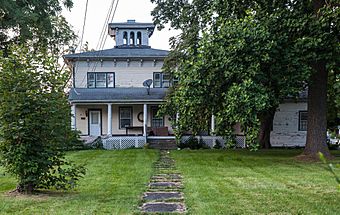Amelia Bloomer House facts for kids
Quick facts for kids |
|
|
Amelia Bloomer House
|
|
 |
|
| Location | 53 E. Bayard St., Seneca Falls, New York |
|---|---|
| Area | 65 acres (26 ha) |
| Built | 1847 |
| Architect | Latham Bros., Builders & Contractors |
| Architectural style | Italianate |
| MPS | Women's Rights Historic Sites TR |
| NRHP reference No. | 80000359 |
| Added to NRHP | August 29, 1980 |
The Amelia Bloomer House is a historic home located in Seneca Falls, New York. It is famous because it was once the home of Amelia Bloomer. She was a very important leader in the temperance and women's rights movements. This house is also believed to have been a stop on the Underground Railroad.
Contents
About the Amelia Bloomer House
The Amelia Bloomer House is a two-story building. It was first built in 1830. Later, in the 1850s, it was updated to the Italianate style. This style was popular at the time. It often features wide eaves, decorative brackets, and tall, narrow windows.
Who Was Amelia Bloomer?
Amelia Bloomer lived in this house. She was a strong voice for change in the 1800s. She believed women should have more rights. She also supported the temperance movement. This movement encouraged people to drink less alcohol.
Amelia Bloomer is also well-known for promoting a new style of clothing for women. This clothing was more practical than the long, heavy dresses of the time. These new outfits included loose trousers gathered at the ankles. They were worn under a shorter dress or skirt. These outfits became known as "bloomers" after her.
A Stop on the Underground Railroad
The Amelia Bloomer House is also thought to have been part of the Underground Railroad. The Underground Railroad was not a real railroad. It was a secret network of safe houses and routes. These routes helped enslaved people escape to freedom in the North. If this house was a stop, it means it offered shelter and safety to those seeking freedom.
A Historic Landmark
Because of its important history, the Amelia Bloomer House is a recognized landmark. It was officially added to the National Register of Historic Places on August 29, 1980. This listing helps protect the house and its history for future generations.
 | Stephanie Wilson |
 | Charles Bolden |
 | Ronald McNair |
 | Frederick D. Gregory |



